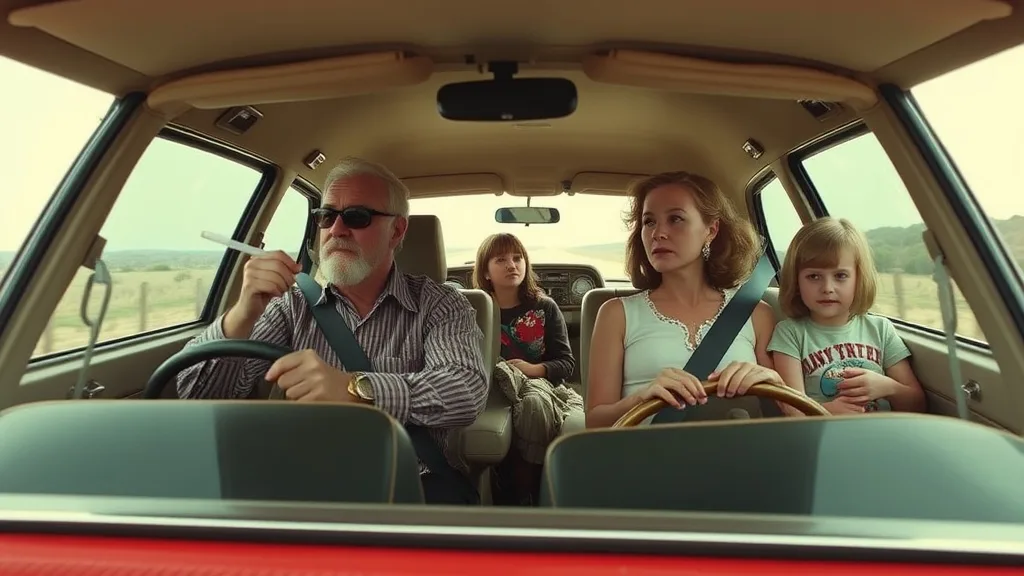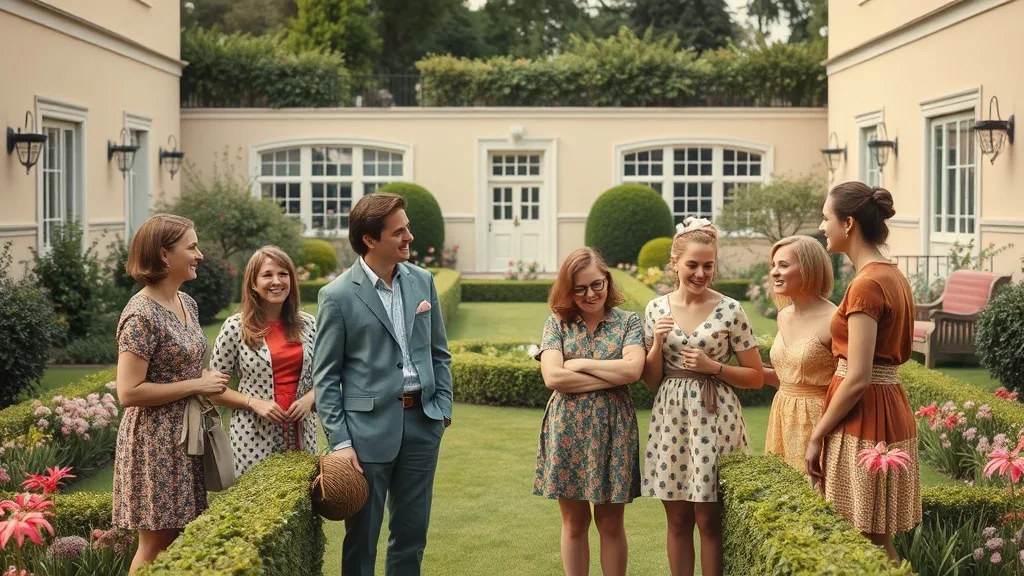Delving Into the Dreamy Symbolism of Wes Anderson's Films
Want a Personalized Dream Interpretation?
Curious about what your dreams mean? Discover personalized interpretations beyond dream symbols. Get insights tailored to you!
Get Free Interpretation Now →Table of Contents
Dreams, like the enigmatic Wes Anderson films, transport us to whimsical realms where reality blurs and imagination takes flight. These cinematic dreamscapes, meticulously crafted with pastel hues and symmetrical compositions, invite us to delve into their myriad layers of symbolism. From nostalgic train rides to eccentric island getaways, Anderson's films weave a tapestry of symbols that unveil hidden meanings, explore profound themes, and illuminate the complexities of the human experience. In this exploration of dream symbols through the lens of Wes Anderson's cinematic artistry, we embark on a journey to decipher the enigmatic messages hidden within the frames of his mesmerizing dreamlike creations.

The Kaleidoscopic Dreamscapes of Wes Anderson: Unveiling the Hidden Symbolism Behind His Cinematic Masterpieces
Symbolism of Dysfunctional Families
Dysfunctional families are commonly represented in Wes Anderson films through visually striking and meticulously constructed sets. These families often inhabit spaces that are both familiar and uncanny, reflecting the complexities and contradictions inherent within the family unit. The homes in Anderson's films are often filled with intricate details and elaborate decorations, creating a sense of both comfort and claustrophobia. The inhabitants of these homes are often trapped in their own private worlds, unable to communicate effectively with one another. The use of symmetry and repetition in Anderson's cinematography further reinforces the idea of a dysfunctional family, as it creates a sense of order and routine that is often juxtaposed with the underlying chaos and dysfunction of the family relationships.
Symbolism of Childhood Nostalgia
Wes Anderson's films are often characterized by their nostalgic and childlike imagery, which serves to evoke a sense of loss and longing for the past. The recurring use of pastel colors, vintage toys, and quirky characters creates a dreamlike atmosphere that transports viewers to a time and place of innocence and wonder. Anderson's films also frequently feature nostalgic soundtracks, composed of classic pop songs and folk melodies, which further enhance the sense of longing for a simpler time.

Symbolism of Symmetry and Order
The deliberate symmetry and meticulously arranged order found in Wes Anderson films symbolize the character's desire for control and perfectionism. This structured visual aesthetic reflects the characters' attempts to impose order on their often chaotic and unpredictable lives. Through carefully crafted compositions and symmetrical shots, Anderson creates a sense of balance and harmony, which can be both comforting and unsettling, highlighting the tension between the desire for order and the reality of life's inherent chaos.
Symbolism of Absurdity and Eccentricity
The absurdity and eccentricity often found in Wes Anderson films can be interpreted as a symbol of the dreamer's own feelings of strangeness or alienation from the world around them. The characters in Anderson's films often find themselves in surreal and bizarre situations, a reflection of the dreamer's own sense of disconnection from reality. The dream may also represent the dreamer's desire to embrace their uniqueness and individuality, even if it means standing out from the crowd.
Symbolism of Control and Repression
Symbolism Meaning: Control and Repression
In a Wes Anderson film, the meticulously controlled and symmetrical aesthetic symbolizes a desire for order and control. The characters often inhabit carefully constructed worlds where every detail is carefully planned, reflecting a need to suppress spontaneity and individuality. This controlled environment can be seen as a metaphor for the repression of emotions, thoughts, and impulses that do not conform to societal norms.
Symbolism of Escape and Fantasy
The whimsical and stylized aesthetics of a Wes Anderson film invite escape and fantasy. The vibrant colors, symmetrical compositions, and playful characters create a dreamlike world where the ordinary becomes extraordinary. In these films, objects, settings, and actions carry symbolic meanings that evoke a sense of nostalgia, longing, and the desire to escape reality.
Symbolism of Escape and Fantasy:
- Pastel Colors: Soft, muted colors evoke a sense of nostalgia and serenity, inviting viewers to retreat into a comforting, idealized world.
- Symmetrical Compositions: Carefully balanced arrangements create a sense of order and control, providing a contrast to the unpredictable nature of the characters' lives.
- Quirky Characters: Eccentric and flawed characters represent the outsider's perspective, encouraging viewers to embrace their own uniqueness and find solace in the different.
- Playful Settings: Grand hotels, vintage stores, and meticulously decorated homes become symbols of the desire to escape the mundane and embrace a world of imagination and creativity.
- Whimsical Objects: Everyday objects are transformed into objects of wonder and curiosity, sparking a sense of childlike exploration and the joy of discovery.
- Slow Motion Shots: Time seems to slow down in Wes Anderson films, allowing viewers to fully immerse themselves in the dreamlike atmosphere and appreciate the beauty of the details.
Biblical Meaning of Wes Anderson Film Dream
Divine Message
Dreaming of a Wes Anderson film often signifies a desire for order, symmetry, and control. Wes Anderson's films are known for their meticulous attention to detail, often employing symmetrical compositions and pastel color palettes. The dream may suggest a need for more structure and organization in your life.
Additionally, the dream could be a Divine message encouraging you to embrace your creativity and individuality. Wes Anderson's films are recognized for their unique visual style and quirky characters. The dream may be a reminder to express your own unique perspective and not conform to societal expectations.
Spiritual Transformation
Dreaming of a Wes Anderson film represents spiritual transformation. It signifies a period of growth and change in your spiritual journey. Just as Wes Anderson's films often explore themes of nostalgia, eccentricity, and the search for meaning, so too can this dream suggest that you are on a quest for deeper understanding and connection with your spiritual self. The film's unique and imaginative style may reflect your own personal experiences and struggles as you navigate the complexities of spiritual growth. Pay attention to the specific characters, settings, and events in the dream, as they may provide insights into your present spiritual state and the path ahead.
Prophetic Vision
Dreaming of a Wes Anderson film signifies that you are entering a period of introspection and reflection. The film's signature aesthetic and whimsical characters represent the subconscious exploring inner thoughts and emotions. The dream invites you to acknowledge and embrace your own unique perspective and artistic expression. Consider the film's themes and symbolism as potential guidance for personal growth and spiritual awareness.
Interpretation of Dreams
Dream Symbol: Wes Anderson Film
Biblical Meaning:
Biblically, dreams are seen as a means of communication between God and humans. Dreams, especially those with surreal or symbolic elements, are believed to carry messages or warnings about the dreamer's life, purpose, or spiritual journey.
In the context of Wes Anderson films, the dreamlike aesthetic and dream-like sequences often evoke a sense of the surreal and the uncanny. These dream-like elements can be interpreted as representations of the dreamer's subconscious mind, their inner thoughts, desires, and fears.
According to biblical interpretation, the dream symbols in a Wes Anderson film can represent the following:
- Symmetry and Order: The meticulously arranged and symmetrical shots in Anderson's films may symbolize a desire for control or a search for order in a chaotic world.
- Nostalgia and Retrospec: The use of retro and nostalgic settings and props reflects the biblical concept of remembrance and longing for the past.
- Eccentric Characters: The quirky and often eccentric characters in Anderson's films may represent the hidden or suppressed aspects of the dreamer's personality.
- Surreal and Unexpected Events: The dream-like sequences and unexpected plot twists in Anderson's films symbolize the unpredictability and mystery of life, as well as the power of the subconscious to challenge and transform.
Wes Anderson's Films: A Cultural and Historical Tapestry of Dream Symbolism
Wes Anderson's films are characterized by their intricate and imaginative visual aesthetics, quirky characters, and an overarching sense of surrealism. They are veritable playgrounds of dream symbolism, replete with hidden meanings and subconscious references.
Throughout history, dreams have served as fertile ground for cultural and historical interpretation. From ancient myths to modern psychology, they have been seen as windows into our collective unconscious, revealing our fears, desires, and hidden truths. Anderson's films tap into this rich tradition, presenting dreamscapes that are at once personal and universal.
His films offer a unique lens through which to examine the cultural landscape of our time. They hold up a mirror to our own dreams, allowing us to confront our fears, grapple with our anxieties, and make sense of an increasingly complex and uncertain world.
7 Situations That Indicate a Wes Anderson Film in Your Dreams: An Exploration of Symbolism and Meaning
1. Dream of a whimsical hotel with eccentric guests (The Grand Budapest Hotel)
Dreaming of a whimsical hotel with eccentric guests, such as in "The Grand Budapest Hotel", symbolizes a desire for escapism and a longing for a simpler, more carefree time. The hotel represents a sanctuary from the complexities of everyday life, where one can indulge in fantasy and imagination. The eccentric guests represent the dreamer's own unique qualities and perspectives, which they may feel stifled or misunderstood in their waking life. This dream suggests that the dreamer needs to embrace their individuality and find ways to express themselves creatively.
2. Dream about a dysfunctional family on a road trip (The Royal Tenenbaums)
Dreaming of a dysfunctional family on a road trip (The Royal Tenenbaums) suggests a desire to reconnect with family members or repair broken family relationships. It may reveal repressed feelings of longing for a closer and more harmonious family dynamic. The journey in the dream could symbolize the emotional journey of trying to overcome obstacles and challenges in family relationships.

3. Dream of a young boy's adventures on a remote island (Moonrise Kingdom)
In Wes Anderson's film "Moonrise Kingdom," the dream of a young boy's adventures on a remote island takes on significant symbolic meaning. The boy, Sam Shakusky, embarks on a fantastical journey to escape his mundane life and connect with nature and the unknown.
His adventures symbolize his longing for freedom, independence, and the pursuit of childhood dreams. The island itself becomes a sanctuary where he can explore his imagination and forge meaningful connections with other outsiders, such as Suzy Bishop.
Through his interactions with Suzy and the other characters, Sam learns valuable life lessons about love, friendship, and the importance of staying true to oneself. The dream culminates in a symbolic battle between the forces of conformity and individuality, represented by the Khaki Scouts and the group of outsiders who support Sam and Suzy.
Ultimately, the dream serves as a reminder that even in the midst of childhood, the pursuit of adventure and the search for meaning in life can lead to profound experiences and personal growth.
5 Demographics of Dreamers Who Might Dream of Wes Anderson Films
1. Film Enthusiasts and Critics
Delve into the enigmatic realm of Wes Anderson films, where dreams unfold in a symphony of meticulous symmetry and quirky eccentricities. For film enthusiasts and critics, these dreams offer a captivating canvas to explore the subconscious depths of cinematic artistry.
Each Andersonian frame holds a meticulous balance, where characters move with calculated precision like marionettes in a surreal puppet show. The dreamlike quality is further enhanced by the director's signature pastel color palette, which evokes a sense of nostalgia and longing.
These dreamscapes often mirror the inner turmoil of the characters, their anxieties veiled in whimsical facades. The meticulous attention to detail, from the perfectly coiffed hair to the precisely placed objects, suggests a desire for control amidst a world that feels chaotic and unpredictable.
For the film enthusiasts who immerse themselves in Anderson's cinematic universe, these dreams become a testament to their passion for the art of storytelling. They unravel the complexities of human relationships, capturing the quirks and idiosyncrasies that make us who we are.
Critics, on the other hand, find in these dreams a playground for intellectual exploration. They dissect the symbolism, analyze the characters' motivations, and uncover the deeper meanings hidden within the director's intricate narratives. These dreams challenge their perceptions and invite them to ponder the significance of each meticulously crafted moment.
2. Fans of Wes Anderson's Films
For those who adore the whimsical worlds of Wes Anderson's films, dreams often take on a distinct and whimsical quality. Here, dreamscapes become quirky, symmetrical, and bathed in Anderson's signature pastel hues.

The characters that inhabit these dreams often resemble the iconic ensemble casts featured in Anderson's movies. They may be eccentric, eloquent, and clad in brightly colored suits or vintage dresses. The settings, too, echo the meticulously crafted environments of Anderson's films, with grand hotels, quaint cafes, and sprawling landscapes meticulously recreated in the dreamer's subconscious.
These dreams often evoke a sense of nostalgia, as if the dreamer is stepping into a familiar and comforting cinematic universe. Yet, beneath this playful exterior, there may also lie hidden meanings and personal reflections that only the dreamer can unravel.
3. Individuals Interested in Symbolism and Interpretation
One particular demographic that finds Wes Anderson's films deeply resonant is individuals interested in symbolism and interpretation. These individuals are drawn to the intricate tapestries of visual and narrative motifs that permeate his work.
Anderson's films offer a treasure trove of symbols to decipher. Geometric shapes, color palettes, and symmetrical compositions all convey layers of meaning. The recurring motif of symmetry, for example, evokes a sense of order and control, while the use of pastel colors often creates an ethereal, dreamlike atmosphere.
Furthermore, Anderson's characters often embody archetypal symbols. The precocious children represent innocence and unbridled imagination, while the eccentric adults symbolize the complexities and absurdities of the human condition. By exploring the interplay of these symbols, individuals interested in symbolism can gain insights into their own psyche and the world around them.
Self-Reflection through Wes Anderson's Cinematic Dreamscapes
Delve into the ethereal realm of Wes Anderson's films, where dreams emerge as enigmatic symbols of self-exploration. His meticulous compositions invite viewers to pause and reflect on the subconscious threads that weave through their own dreams.
Anderson's characters often navigate landscapes that are both familiar and disorienting. They wander through pastel-hued mansions, encounter quirky strangers, and confront their deepest fears and desires. These dreamlike sequences become mirrors of their inner worlds, prompting viewers to question their own motivations, relationships, and aspirations.
Embark on a journey of self-discovery by keeping a dream journal. Record your nightly adventures and revisit them with the help of an AI dream interpreter like Dream Decoder. Let the symbols emerge from the depths of your unconscious mind, revealing hidden aspects of yourself. Each interpretation becomes a stepping stone towards a deeper understanding of your own dreams and the subconscious forces that shape your waking life.
